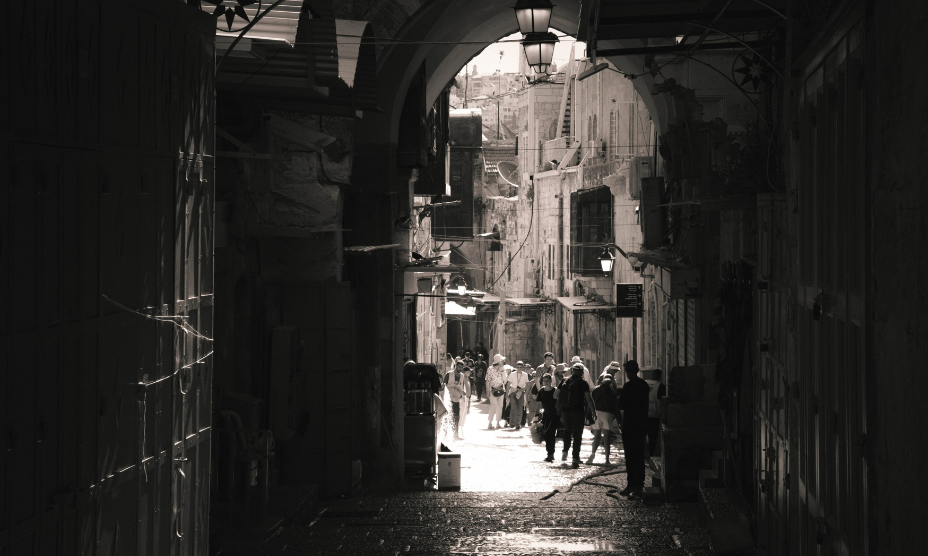“How the city that overflowed with people sits alone, become like a widow; she who was great among the nations, princess of states, now a forced laborer. She weeps, weeps through the nights; on her cheeks, tears. Of all her lovers none console her; all her friends have betrayed her, become enemies to her” (Eicha 1:1-2).
The prophet Yirmiyahu wrote the Book of Eicha, which we read on Tisha B’Av—the Jewish People’s annual day of mourning for the destruction of the Beit HaMikdash. In the book’s opening verses, Yirmiyahu poetically describes the demise of a once-thriving capital. Missing its people, its purpose, its soul, the city only has tears running through its streets. Yirmiyahu speaks of Jerusalem as a mourner. It is she, once a mother rejoicing with her children, who is grief-stricken, struggling to grasp the elusive understanding of loss. But she does not grieve alone. We, the exiled, Yirmiyahu says, are “her little children” who “walked away, captives, before foes” (1:6).
The national loss experienced with our mother Jerusalem is not easily felt in today’s time. Eicha’s words can feel abstract, divorced from our present emotional reality. As our guests spoke about their personal experiences of loss, we turned to look at how the two intersected on Tisha B’Av, how that converged with the nation.
David Bashevkin:
I wanted to reflect on the notion of loss on Tisha B’Av, and Tisha B’Av has this idea of subsuming all loss and all tragedy inside of it. And I think it’s a really fascinating way of thinking about that idea, of other elements of sadness being subsumed in other calendric markers. I’m curious. On Tisha B’Av, you returned to mourning in a way, collective mourning. Are there places in, whether it’s Eicha, or the Kinnos, that you reflect on your personal loss?
Dani Ritholtz:
Yeah, for sure, and on Tisha B’Av in general, because… and I think everyone has a little bit of a difficulty connecting to that date, because it’s abstract for us, sadly. Even though, yes, we don’t have a Beit HaMikdash, but we don’t know what it was like to have one. So I think there’s this disconnect there. So what I try to do personally is I try to tap into how I felt during mourning. Almost feeling like, what should I be feeling? What is the feeling – because I know the emotions, and I know what actual mourning is, and now trying to relate it into this national mourning that we’re supposed to be doing on Tisha B’Av. So I definitely do try to do that, even at the beginning, right before you start Maariv, right before Eicha, I try to remember how I felt during those times to get me in the right mindset.
The relationship, not the building, is what we mourn.
One of the commemorative acts of Tisha B’Av is reading kinnot, elegies—sad poems, or reflective lamentations. Dani told us about one that specifically speaks to him. It contrasts our exile from Egypt with the exile from Jerusalem in powerful, distinct tones. And it is powerful to Dani for more than just its thematic strength. He explained:
First and foremost, I think my earliest memory of Tisha B’Av, we used to go up to the Catskills, and I remember very vividly my dad singing this kinna. So I don’t really remember all the other Kinnot, but I remember that one specifically because I remember my dad singing it, I could hear him singing it, and usually how you sing it, you sing it really loudly for the triumph of leaving Mitzrayim, and then softly and dejected for what happened in the exile and from Jerusalem.
So I definitely go back to that, like I know exactly what my dad was saying, and then I have a personal feeling for that, when I found out in the old city of Jerusalem that my dad passed away. And I remember vividly walking out of the walls of Yerushalayim with a few of my friends and a rabbi from Yeshivat HaKotel, and I don’t know how I was thinking about this at the time, but I just remembered, I was like, “This must be like 1/100th of what people were feeling like at the churban,” leaving Yerushalayim, this feeling of shock and rejection, almost.
Relating this kinna to his father, whether through memory or emotion, gave Dani a new dimension to Tisha B’Av. He heard his individual loss speaking through our collective loss. When we posed the question to Josh, he similarly found greater resonance with Tisha B’Av. Here’s what he had to say:
So for sure. Tisha B’Av happens to be one of the days on the Jewish calendar that I think we often misrepresent, I would say, or focus on the wrong part. Whenever I talk about Tisha B’Av and the mourning that we’re doing, of course, we’re mourning the loss of the temple, the Beis HaMikdash. But … what we’re really mourning is the relationship that we had with God in the temple in the Beis HaMikdash. And that’s the loss.… So that being the case, I think that we sometimes don’t focus on that, but we really should, because I think, I know I experience, and I have to imagine others do as well, that we don’t always feel that connection to God because we’re in exile, and because we don’t have that direct feeling of connection to God…. And I think that that has a lot of parallels in personal loss because, again, what you’re mourning is that relationship. That relationship that you had in your life that’s no longer present is really what you’re mourning. You’re mourning the fact that this person who is such a big part of my life is no longer here to experience things together, to build that relationship, to grow through life together, is really what you’re missing.
The relationship, not the building, is what we mourn. With friends, family, and community members in our lives, we can appreciate our connections, but it is difficult to truly cherish it when you still have it. Josh linked this to Tisha B’Av by replacing our relationships with humans with our relationships with Hashem.
Again, I know that I’ve never seen it, and I know that I’ve never been to the Beis HaMikdash, but I also know that whatever relationship I have with God is very incomplete and is very fraught with questions and doubts and clouded by a lot of other things. And I believe that that’s because we don’t have the Beis HaMikdash, because we don’t have that connection to God, the national connection to God but also the personal connection to God through that beautiful building, we call it.
All this could lead one to sit and wallow in their tears: There is no rebuilt Jerusalem; there is no Beit HaMikdash; there is no complete connection with God. Tisha B’Av may end, but the feelings don’t seem like they will. This was another area Josh spoke to, connecting it to the passing of his first wife, Dannie.
[Yirmiyahu] says, “Lama lah netzach tishkacheinu?” He asked God, why did you forget us forever? And it seems like forever. Again, not to say in historical terms, it has been really short, it just happened. But there’s a feeling, again, of the foreverness of it. There’s a feeling of like, I’m never going to lose this feeling. It’s feeling like when you’re in that moment of pain, how am I ever going to get past this? And that feeling is so overwhelming and consuming. And I think that emotion is meant to be evoked on Tisha B’Av, and it’s meant to feel, if we can, again, that feeling of why is this going on forever in a certain sense, not the emotional side but in the historical side. Now we’re like, yeah, it has been going on forever. It’s been 2,000 years, what’s going on?
But when Yermiyahu wrote it, it just happened. And still he was saying it feels like forever, it feels like this feeling is never going to go away. And that very much resonates with me. Because I know that when I first experienced the loss, I remember feeling like I don’t know how I’m ever going to function a day in my life, I feel like this is never going to change and like, oh my gosh. And now, looking back three years later, and even after, again, I would say a year or so changed, but even more so now, again, there’s still a loss, but it’s a totally different way of feeling about it, especially I’ve been remarried and my life has moved on in a certain sense and gone forward, you feel like you’re never going to get out of that moment. And again, “time heals” is an interesting phrase, but in a certain sense, time heals, in a certain sense there’s the ability to move on. Circling back to the stages of grief, there’s a certain sense of being able to move forward.
Time is a friend, Josh tells us, and that is very much included in the message of Tisha B’Av. When there is no peace, Rabbi Shimon Chassidah is quoted as saying in Masechet Rosh Hashanah 18b, fast days will remain tragic for now, but once we have peace, the fast days will be recast as days of joy and gladness. The sorrow of Tisha B’Av will not last forever—one day, we will rejoice. Until then, however, we remain on the ground, and we cry together.





































